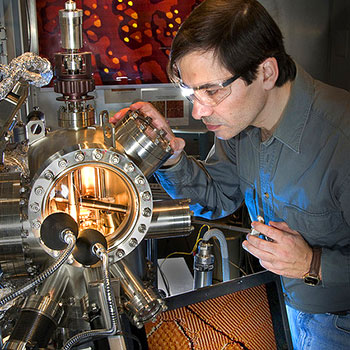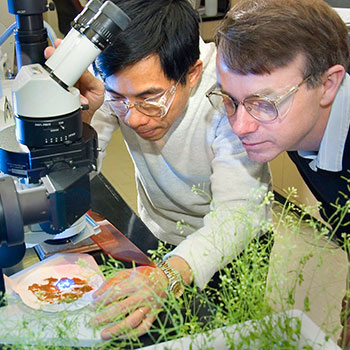Research for a Sustainable Future
Brookhaven researchers are developing advanced technologies to power the transition to new, more efficient, and sustainable energy sources to meet the world’s current and future energy needs.
Energy Sciences
Our researchers are working to solve grand challenges in energy sciences that will help to ensure the nation’s current and future energy supply. Advances in basic science are the underpinning of the transformational discoveries that result from Brookhaven’s data-driven research, cutting-edge synchrotron science, and leadership in energy innovation through the study and understanding of the physical processes that take place in materials used in the energy industry. Brookhaven’s energy research focuses on challenges in such areas as energy storage, chemistry for sustainable energy and the environment, advanced materials, energy delivery and efficiency, and more.
We're leveraging our world-class scientific staff, one-of-a-kind facilities, and key partnerships in New York State and beyond to advance two overarching areas of energy science and technology research: modernization of the nation’s electrical infrastructure and sustainable chemical conversions. Our research addresses challenges at all essential points in the energy pipeline —conversion, transmission, storage, and end use — with initiatives ranging from fundamental physics to grid integration and utility-scale deployment.
Our work to help modernize the electric grid includes studies of grid scale storage, renewables integration and advanced controls; including the ability for field testing new grid technologies at the Northeast Solar Energy Research Center. BNL’s research in energy conversion includes the development of advanced electrocatalysts for fuel cells, catalysts for pollution reduction, biofuels, and solar-to-fuel conversion methods.
More on our energy research
Brookhaven Lab researchers study catalysts that could help improve the performance of fuel cells.
Biological Sciences, Energy, and Environment
Brookhaven Lab scientists conduct fundamental research into the technologies that will enable the transition to a secure, sustainable, and resilient low-carbon society. With recognized expertise in plant sciences, imaging, and climate studies, Brookhaven Lab advances some of the most promising scientific methods of achieving a sustainable future. Our cross-disciplinary research seeks to understand the relationships between climate change, sustainable energy initiatives, and the planet’s natural ecosystems. As environmental and economic issues mount, this research will provide increasingly important guidance and opportunities for climate change management strategies, approaches to adaptation, and policy decisions.
Prominent areas of research include aerosol related infrastructure, climate and process modeling, radiobiology, synthetic and structural biology, and the characterization of biological systems. In the biological sciences we're working to understand the principles underlying carbon capture, conversion, and storage in living systems and developing the capability to model and predict these processes in plants and microorganisms. We're studying aerosol chemistry and microphysics to understand how aerosols affect clouds, precipitation, and climate. And we're studying the terrestrial ecosystem to improve the representation of ecosystem processes in Earth System Models which will increase our ability to understand and project global change.
More on our biosciences research
Brookhaven scientists are investigating engineered oils which could be used to produce feedstocks for industrial processes in place of those currently obtained from petrochemicals.



